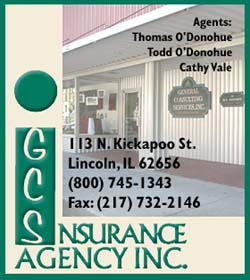|
Led
by Wendy Bell, Lincoln’s Main Street program director, and Jan
Wright, its vice president, the tour began at the recently restored
Scully Park. Wood was given the history of each site visited and told
about the improvements that had been made.

The
tour proceeded across the Don Shay Parking Plaza and through the
arcade tunnel to Pulaski Street. Woods commented on the uniqueness of
the arcade’s architecture.
The
group moved to the courthouse, stopping at the Indian Maiden statue,
where the fund-raising efforts for refurbishing the statue were
discussed.
Wood
visited with the owners and employees of Beans ’n’ Such, The Other
Side of the Fence, Eckert’s Fine Furnishings, Eckert’s Fine Dining
and Grapes and Grounds. She spoke with the proprietors of each of
these locations about their renovations. Pat Grathwotl, an employee of
The Other Side of the Fence, spoke to the lieutenant governor about
their vendors over her knitting. Wood asked her what she was knitting,
and Grathwotl replied, "Dish rags."
During
her visit Lt. Gov. Wood also did what she would refer to later as her
own "private economic restructuring," otherwise known as
shopping.
The
lieutenant governor posed for pictures with her children, Brandon, 14,
and Courtney, 11, in front of the watermelon slice that commemorates
where Abraham Lincoln christened the town of Lincoln in Centennial
Park.
From
there she proceeded into the Restaurant at the Depot for a small
reception, where she was met by Abraham Lincoln look-alike Charlie Ott,
along with Mayor Joan Ritter, Sen. Robert Madigan, Rep. John Turner,
members of the Chamber of Commerce, local business owners and other
Main Street supporters.

(To top of second
column in this article)
|
Before
her speech the lieutenant governor was presented with Lincoln’s
first official Christmas ornament, a bag filled with gifts from
Lincoln, a Balloon Fest T-shirt and praises from town officials and
others involved with the program.
Wood
opened by saying, "I wanted to see all of the Main Street
Programs firsthand and to thank all of you who supported the
program." She thanked her children for sharing in the experience
of traveling to the 55 Main Street cities over the past two summers.
Wood
praised Valecia Crisafulli of Lincoln as being the first Main Street
coordinator and said that it was her vision, hard work, energy and
enthusiasm that launched the program.

She
commented that the most successful programs are the ones where
municipal leaders, businesses and volunteers work together to create
their own visions. Revitalization brings more than physical changes to
downtown structures; it also brings a sense of community back to
downtown, she said.
She
concluded by adding, "I want Illinois to have the best Main
Street programs in the nation."

The
Illinois Main Street program, part of the Department of Commerce and
Community Affairs, promotes preservation-based downtown
revitalization. The program provides training and technical assistance
to participating communities through educational workshops and on-site
consultation, based on a national model.
Wood
heads the newly appointed Main Street State Advisory Board.

[Kym
Ammons-Scott]
|
|
The
treatment plant must be upgraded to meet Illinois Environmental
Protection Agency (IEPA) requirements which go into effect in
September of 2001 and to allow for continued growth in the city,
according to Grant Eaton, plant manager. The IEPA reviews all new
sewer hookups and could refuse permission for such hookups in the
future if the treatment plant does not meet the new standards. The
plant, part of which was built in 1936, has not had a major
improvement since 1976, Eaton said.
The
exact cost of the project will not be determined until after the
preliminary design is completed, but Eaton estimated it at $8.5 to $9
million. EMC will bring final cost figures to the board sometime in
October, he said. A timetable submitted by EMC shows construction
beginning in the spring of 2001 and continuing through May of 2002.

The
upgrade would bring the capacity of the treatment plant to 5.12
million gallons per day, up from the current capacity of 3.35 million
gallons, according to EMC director of operations Carl Alsbach. EMC
currently operates the water treatment plant and maintains the city’s
sewers.
Eaton
said the city is applying for a $100,000 grant for design and a
$400,000 grant for construction of the plant from the Illinois
Department of Commerce and Community Affairs and is also seeking other
grants. Other financing will come from the State Revolving Loan Fund,
to be repaid over 20 years.

The
council also heard a proposal from Matthew R. Hortenstine of Spectrum
Energy Inc. asking the city to cooperate with the Logan County Board
and New Holland to build an electricity generating plant on five acres
on the east side of New Holland. Spectrum would like the city to
provide an Enterprise Zone and also to treat the wastewater from the
proposed plant’s cooling system.
The
generating plant would be a "peaker plant," providing energy
only during times of high demand to prevent brownouts or blackouts,
Hortenstine said. Spectrum, which has several similar facilities in
Illinois, would build the plant and then sell it to a utility company
to operate. The plant would use natural gas, a clean source of power,
instead of coal or nuclear power. It would operate from about the
first of June through mid-September, when air conditioners cause peak
power usage, and cannot operate more than 3,000 hours per year.
(To top of second
column in this article)
|
Hortenstine
asked the council to consider two ways in which the city could
cooperate in what he termed a "win-win" project. First,
Spectrum would like the city to create an extension of its Enterprise
Zone, a strip that would run from Lincoln’s west side to New
Holland, to take advantage of the 6.25 percent state sales tax waiver
on the purchase of equipment and materials.

However,
he said, the company is not asking for a waiver of local taxes.
"We want to take advantage of the state sales tax an Enterprise
Zone allows us to avoid, but we are not asking for a local real estate
tax abatement," he told the council.
He
also said the company might dig a well in the New Holland area, give
it to the town, and become a customer and purchase the water.
The
city of Lincoln could also "win" by treating the wastewater
from the generator, Hortenstine explained. He said there would be no
toxic chemicals in the water – merely a concentration of the normal
minerals – because the wastewater would be "boiled down"
before being trucked to Lincoln for treatment. Although there are no
industrial additives, the IEPA mandates that the water be treated, he
said.
The
city would be paid three cents a gallon for treatment and also a fee
for trucking the water to Lincoln. Eaton told the council three cents
was a good price and said there would not be a problem treating the
wastewater.
Hortenstine
noted that there might be as many as 125 to 150 construction jobs
created in building the plant, and four to 10 permanent jobs for its
operation. The permanent jobs would be "high tech" –
electrical engineers, computer technicians and similar jobs – he
told the board.
He
invited the council to visit Spectrum’s other plants in the area,
and said the agreement he would like to make with the city would be
identical to the agreement Spectrum has with Effingham and St. Elmo.

The
proposal was referred to the ordinance committee for further study.
Charlotte
Griffin, who lives on Edgar Street, asked the council to consider
allowing some leaf burning in the city. She said there are 30 trees in
her neighborhood and disposing of fallen leaves was a problem.
She
suggested that for one season the city try a proposal that yard debris
could be burned three days a week, such as Tuesdays, Thursdays and
Saturdays. That would give people with respiratory ailments four days
a week to enjoy the outdoors. "To me this would be the perfect
compromise," she said.
[Joan
Crabb]
|
|
Michael
Simonson and Scott Martin were awarded a bid of $9,600 to paint
hangers at the county airport. The bid also included the painting of
two grain bins at the county farm.
Schmidt
Construction of Mount Zion was awarded a bid of $94,619 for highway
work in Corwin Township.

Dick Hurley, chairman of the
building and grounds committee, recommended the board accept a bid of
$5,100 from B&W Tree Trimming of Delavan for work at Scully and
Latham parks. The vote failed to gather a two-thirds majority, which
was required according to the board's guidelines.
(To top of second
column in this article)
|
Hurley
then proposed the board accept B & W's bid for work at Latham Park
for $2,500. This portion of the work passed with a simple majority,
since it was below the guidelines for the two-thirds vote requirement.
Hurley had
sought bids from a Mount Pulaski firm and from B & W for work at
the two parks.
The board
also learned that Spectrum Energy, the firm pursuing the construction
of three small "peeker plants" one-half mile east of New
Holland, had filed for a permit from the Illinois Environmental
Protection Agency.
The plants
would generate electricity during peak usage times, normally in the
summer when demand is greatest.
The agency will accept public
input until Sept. 7 regarding the permit.
[Fuzz
Werth]
|



